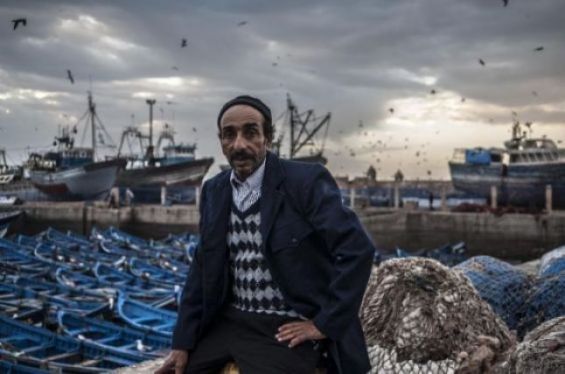Because it is out of the ordinary and even hard to believe, Moroccan writer Hassan Ramouti decided to immortalize the story of the Moroccan sailor Larbi Babmar in a book entitled «Al Imtidad Al Azraq» (the blue extension). Published in 2013, the book was based on the story told by this Moroccan adventurer himself, after a journey that lasted more than three months.
The idea of crossing the Atlantic aboard a fishing boat was first evoked by a certain Mohamed Faouzi, a Casablanca-native who one day came to Larbi Babmar and told him about it. Babmar accepted after consulting his parents and his wife. In «Al Imtidad Al Azraq» he said that his wife did not oppose this idea. «She thought that America is very close to Morocco, because she had never been to school», he recalled.
Larbi later admitted that his calculations before the trip were not correct, even though he knew that this trip would take many days, he did not expect it to last for 90 days. «I had not asked those who know the distance between Essaouira beach and America. I thought I would get there with my friend in about a month», said Larbi Babmar. «The reason why we did that was because my friend and I did not want anyone to know about this trip. Everyone would oppose it and consider us crazy», he explained.
Sailing for more than 90 days
The choice of August 20, 1989, as the start date of the adventure was not arbitrary. Larbi and his friend knew that during this national holiday they could keep a low profile in the post of Mogador, without attracting the attention of cost guards. Larbi Babmar, born in 1950 in the Diabat region near Essaouira, remembers how his traveling companion had «returned from Casablanca and had bought some products with him, such as chocolate, fruit, sugar, figs, cigarettes and oil» as well as «cans to store water and two small gas canisters». «My friend had not forgotten about fishing tools to help us when the food stock gets exhausted, as well as a small radio and a flashlight», he recalled.
«Some friends were present at the port to say goodbye, as was my youngest son. The image of his tears on his cheeks is still in my mind to this day».
After three days of sailing, the adventurer seriously considered returning to Essaouira, but his friend tried to persuade him not to. «When the boat left the harbor, I looked back every now and then, seeing the mainland and my city slowly receding», Larbi remembered.

At first, the sailor was counting the days by carving little marks with a sharp tool on the edge of his boat, before giving up as «the days had become the same». During the journey, conversations had become a way to forget time.
After their food ran out, the two Moroccans turned to fishing. «We used to empty the entrails of the fish and put them in the sun to become food for us during our long journey», said Larbi Babmar, who also mentioned violent storms that threatened their lives, but which they managed to survive thanks to the wisdom of the sailor and his experience. «I had once seen a big fish. It seemed at first like a small submarine», he said.
«Prayers were part of my ritual because it is an obligation that must be preserved. It reassured me and reminded me that God is with me, in the midst of this vast world of salt water».
French Guiana instead of the United States
The two adventurers started to lose hope of making it on land, especially as they started losing weight and having difficulties moving after three months of sailing. One day, his companion, who regularly stood at the bow of the boat looking at the horizon as if he was feeling something was close, suddenly shouted : «Si Larbi. I see something. Yes, I see rocks in the distance, maybe an island».
Larbi Babmar, who had lost hope, initially believed that it was a «mirage». «I had thought it was just a dark gray cloud on the horizon looking like a forest, but it was a row of compact trees», he described. «It was not the coast of America, as we had hoped, but of a still new world; a country I had never heard of before», he added. It was, in fact, French Guyana.
After their arrival, the two adventurers announced to sailors, «some of whom spoke French with difficulty», that they had come from Morocco and that they had just crossed the ocean. «They were stunned. Maybe they didn't believe what we were saying or didn't know where Morocco is», he said.
The port administration did not believe their stories either, nor did the Guyana police, only after inspecting the boat, carrying out a search and transferring the two Moroccans to a hospital. «There we had received medical care and great attention from the doctors and nurses. We hadn't stayed there for long and when we left, we had received temporary residence cards», he said. The news of their arrival had then spread and their boat was the subject of many visits.
A return to Morocco after a year and a half spent in Guyana
But Larbi and Mohamed Faouzi ended up parting ways. The latter left to work in construction and then in the sea before making the decision to return to Morocco. As for Larbi Babmar, he tried to reach his family by phone, but did not succeed.
He then met a journalist wanting to interview him, who managed to find the telephone number of the police in Essaouira. «I called and asked for a police sergeant, who dispatched someone to inform my family. But after my second phone call, I was asked not to call that number back», he recalled.

The Moroccan finally managed to get the phone number of a café near his house, called his family and decided to stay in Guyana for a year and a half before returning to Morocco.
«I didn't experience much trouble to travel, because Guyana is part of France. So I left the place with the same identity papers that had been given to me. The ticket was not very expensive (...) It was around nine hundred Moroccan dirhams».
From Guyana to the Paris Orly airport then to Casablanca, the Moroccan spent a few days in police custody. After his release, he returned to Essaouira, to his friends, his family and his wife, who was angry at him because he had left her with no support.
In a statement to Yabiladi, Moroccan writer Hassan Ramouti said that Larbi Babmar is now about 70 years old, suffers from Alzheimer and his health is deteriorating, specifying that the revenue from the sales of his book, which describes his journey, were given to the Moroccan adventurer.





 chargement...
chargement...













